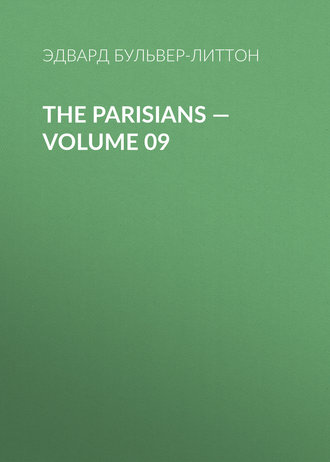
Эдвард Бульвер-Литтон
The Parisians — Volume 09
"Not as you so morbidly put it, silly girl,—certainly not right. But I do wish that you had the shelter and protection which Madame Savarin meant to express; I do wish that you were happily married to one very different from Mr. Vane—one who would be more proud of your genius than of your beauty—one who would say, 'My name, safer far in its enduring nobility than those that depend on titles and lands—which are held on the tenure of the popular breath—must be honoured by posterity, for She has deigned to make it hers. No democratic revolution can disennoble me."
"Ay, ay, you believe that men will be found to think with complacency that they owe to a wife a name they could not achieve for themselves. Possibly there are such men. Where?—among those that are already united by sympathies in the same callings, the same labours, the same hopes and fears with the women who have left behind them the privacies of home. Madame de Grantmesnil was wrong. Artists should wed with artists. True—true!"
Here she passed her hand over her forehead—it was a pretty way of hers when seeking to concentrate thought—and was silent a moment or so.
"Did you ever feel," she then asked dreamily, "that there are moments in life when a dark curtain seems to fall over one's past that a day before was so clear, so blended with the present? One cannot any longer look behind; the gaze is attracted onward, and a track of fire flashes upon the future,—the future which yesterday was invisible. There is a line by some English poet—Mr. Vane once quoted it, not to me, but to M. Savarin, and in illustration of his argument, that the most complicated recesses of thought are best reached by the simplest forms of expression. I said to myself, 'I will study that truth if ever I take to literature as I have taken to song;' and—yes—it was that evening that the ambition fatal to woman fixed on me its relentless fangs—at Enghien—we were on the lake—the sun was setting."
"But you do not tell me the line that so impressed you," said Mrs. Morley, with a woman's kindly tact.
"The line—which line? Oh, I remember; the line was this:
"'I see as from a tower the end of all."
"And now—kiss me, dearest—never a word again to me about this conversation: never a word about Mr. Vane—the dark curtain has fallen on the past."
CHAPTER XI
Men and women are much more like each other in certain large elements of character than is generally supposed, but it is that very resemblance which makes their differences the more incomprehensible to each other; just as in politics, theology, or that most disputatious of all things disputable, metaphysics, the nearer the reasoners approach each other in points that to an uncritical bystander seem the most important, the more sure they are to start off in opposite directions upon reaching the speck of a pin-prick.
Now there are certain grand meeting-places between man and woman—the grandest of all is on the ground of love, and yet here also is the great field of quarrel. And here the teller of a tale such as mine ought, if he is sufficiently wise to be humble, to know that it is almost profanation if, as man, he presumes to enter the penetralia of a woman's innermost heart, and repeat, as a man would repeat, all the vibrations of sound which the heart of a woman sends forth undistinguishable even to her own ear.
I know Isaura as intimately as if I had rocked her in her cradle, played with her in her childhood, educated and trained her in her youth; and yet I can no more tell you faithfully what passed in her mind during the forty-eight hours that intervened between her conversation with that American lady and her reappearance in some commonplace drawing-room, than I can tell you what the Man in the Moon might feel if the sun that his world reflected were blotted out of creation.
I can only say that when she reappeared in that commonplace drawing-room world, there was a change in her face not very perceptible to the ordinary observer. If anything, to his eye she was handsomer—the eye was brighter—the complexion (always lustrous, though somewhat pale, the limpid paleness that suits so well with dark hair) was yet more lustrous,—it was flushed into delicate rose hues—hues that still better suit with dark hair. What, then, was the change, and change not for the better? The lips, once so pensively sweet, had grown hard; on the brow that had seemed to laugh when the lips did, there was no longer sympathy between brow and lip; there was scarcely seen a fine threadlike line that in a few years would be a furrow on the space between the eyes; the voice was not so tenderly soft; the step was haughtier. What all such change denoted it is for a woman to decide-I can only guess. In the mean while, Mademoiselle Cicogna had sent her servant daily to inquire after M. Rameau. That, I think, she would have done under any circumstances. Meanwhile, too, she had called on Madame Savarin—made it up with her —sealed the reconciliation by a cold kiss. That, too, under any circumstances, I think she would have done—under some circumstances the kiss might have been less cold.
There was one thing unwonted in her habits. I mention it, though it is only a woman who can say if it means anything worth noticing.
For six days she had left a letter from Madame de Grantmesnil unanswered. With Madame de Grantmesnil was connected the whole of her innermost life —from the day when the lonely desolate child had seen, beyond the dusty thoroughfares of life, gleams of the faery land in poetry and art-onward through her restless, dreamy, aspiring youth-onward—onward—till now, through all that constitutes the glorious reality that we call romance.
Never before had she left for two days unanswered letters which were to her as Sibylline leaves to some unquiet neophyte yearning for solutions to enigmas suggested whether by the world without or by the soul within. For six days Madame de Grantmesnil's letter remained unanswered, unread, neglected, thrust out of sight; just as when some imperious necessity compels us to grapple with a world that is, we cast aside the romance which, in our holiday hours, had beguiled us to a world with which we have interests and sympathies no more.
CHAPTER XII
Gustave recovered, but slowly. The physician pronounced him out of all immediate danger, but said frankly to him, and somewhat more guardedly to his parents, "There is ample cause to beware." "Look you, my young friend," he added to Rameau, "mere brain-work seldom kills a man once accustomed to it like you; but heart-work, and stomach-work, and nerve- work, added to brain-work, may soon consign to the coffin a frame ten times more robust than yours. Write as much as you will—that is your vocation; but it is not your vocation to drink absinthe—to preside at orgies in the Maison Doree. Regulate yourself, and not after the fashion of the fabulous Don Juan. Marry—live soberly and quietly—and you may survive the grandchildren of viveurs. Go on as you have done, and before the year is out you are in Pere la Chaise."
Rameau listened languidly, but with a profound conviction that the physician thoroughly understood his case.
Lying helpless on his bed, he had no desire for orgies at the Maison Doree; with parched lips thirsty for innocent tisane of lime-blossoms, the thought of absinthe was as odious to him as the liquid fire of Phlegethon. If ever sinner became suddenly convinced that there was a good deal to be said in favour of a moral life, that sinner at the moment I speak of was Gustave Rameau: Certainly a moral life—'Domus et placens uxor',—was essential to the poet who, aspiring to immortal glory, was condemned to the ailments of a very perishable frame.
"Ah," he murmured plaintively to himself, "that girl Isaura can have no true sympathy with genius! It is no ordinary man that she will kill in me!"
And so murmuring he fell asleep. When he woke and found his head pillowed on his mother's breast, it was much as a sensitive, delicate man may wake after having drunk too much the night before. Repentant, mournful, maudlin, he began to weep, and in the course of his weeping he confided to his mother the secret of his heart.
Isaura had refused him—that refusal had made him desperate.
"Ah! with Isaura how changed would be his habits! how pure! how healthful!" His mother listened fondly, and did her best to comfort him and cheer his drooping spirits.
She told him of Isaura's messages of inquiry duly twice a day. Rameau, who knew more about women in general, and Isaura in particular, than his mother conjectured, shook his head mournfully. "She could not do less," he said. "Has no one offered to do more?"—he thought of Julie when he asked that—Madame Rameau hesitated.
The poor Parisians! it is the mode to preach against them; and before my book closes, I shall have to preach—no, not to preach, but to imply— plenty of faults to consider and amend. Meanwhile I try my best to take them, as the philosophy of life tells us to take other people, for what they are.
I do not think the domestic relations of the Parisian bourgeoisie are as bad as they are said to be in French novels. Madame Rameau is not an uncommon type of her class. She had been when she first married singularly handsome. It was from her that Gustave inherited his beauty; and her husband was a very ordinary type of the French shopkeeper—very plain, by no means intellectual, but gay, good-humoured, devotedly attached to his wife, and with implicit trust in her conjugal virtue. Never was trust better placed. There was not a happier nor a more faithful couple in the quartier in which they resided. Madame Rameau hesitated when her boy, thinking of Julie, asked if no one had done more than send to inquire after him as Isaura had done.
After that hesitating pause she said, "Yes—a young lady calling herself Mademoiselle Julie Caumartin wished to instal herself here as your nurse. When I said, 'But I am his mother—he needs no other nurses,' she would have retreated, and looked ashamed—poor thing! I don't blame her if she loved my son. But, my son, I say this,—if you love her, don't talk to me about that Mademoiselle Cicogna; and if you love Mademoiselle Cicogna, why, then your father will take care that the poor girl who loved you not knowing that you loved another is not left to the temptation of penury."
Rameau's pale lips withered into a phantom-like sneer! Julie! the resplendent Julie!—true, only a ballet-dancer, but whose equipage in the Bois had once been the envy of duchesses—Julie! who had sacrificed fortune for his sake—who, freed from him, could have millionaires again at her feet!—Julie! to be saved from penury, as a shopkeeper would save an erring nursemaid—Julie! the irrepressible Julie! who had written to him, the day before his illness, in a pen dipped, not in ink, but in blood from a vein she had opened in her arm:
"Traitor!—I have not seen thee for three days. Dost thou dare to love another? If so, I care not how thou attempt to conceal it—woe to her! Ingrat! woe to thee! Love is not love, unless, when betrayed by Love, it appeals to death. Answer me quick—quick. JULIE."
Poor Gustave thought of that letter and groaned. Certainly his mother was right—he ought to get rid of Julie; but he did not clearly see how Julie was to be got rid of. He replied to Madame Rameau peevishly, "Don't trouble your head about Mademoiselle Caumartin; she is in no want of money. Of course, if I could hope for Isaura—but, alas! I dare not hope. Give me my tisane."
When the doctor called next day, he looked grave, and, drawing Madame Rameau into the next room, he said, "We are not getting on so well as I had hoped; the fever is gone, but there is much to apprehend from the debility left behind. His spirits are sadly depressed." Then added the doctor, pleasantly, and with that wonderful insight into our complex humanity in which physicians excel poets, and in which Parisian physicians are not excelled by any physicians in the world: "Can't you think of any bit of good news—that 'M. Thiers raves about your son's last poem! that 'it is a question among the Academicians between him and Jules Janin'—or that 'the beautiful Duchesse de ———- has been placed in a lunatic asylum because she has gone mad for love of a certain young Red Republican whose name begins with R.'—can't you think of any bit of similar good news? If you can, it will be a tonic to the relaxed state of your dear boy's amour propre, compared to which all the drugs in the Pharmacopoeia are moonshine and water; and meanwhile be sure to remove him to your own house, and out of the reach of his giddy young friends, as soon as you possibly can."
When that great authority thus left his patient's case in the hands of the mother, she said, "The boy shall be saved."







